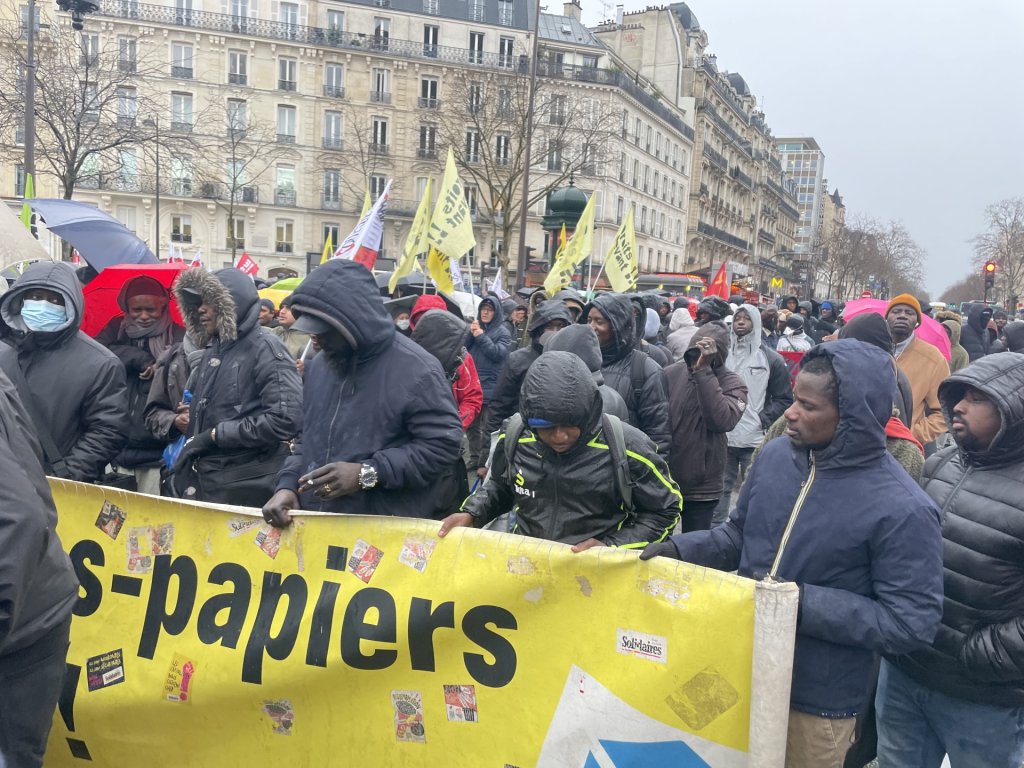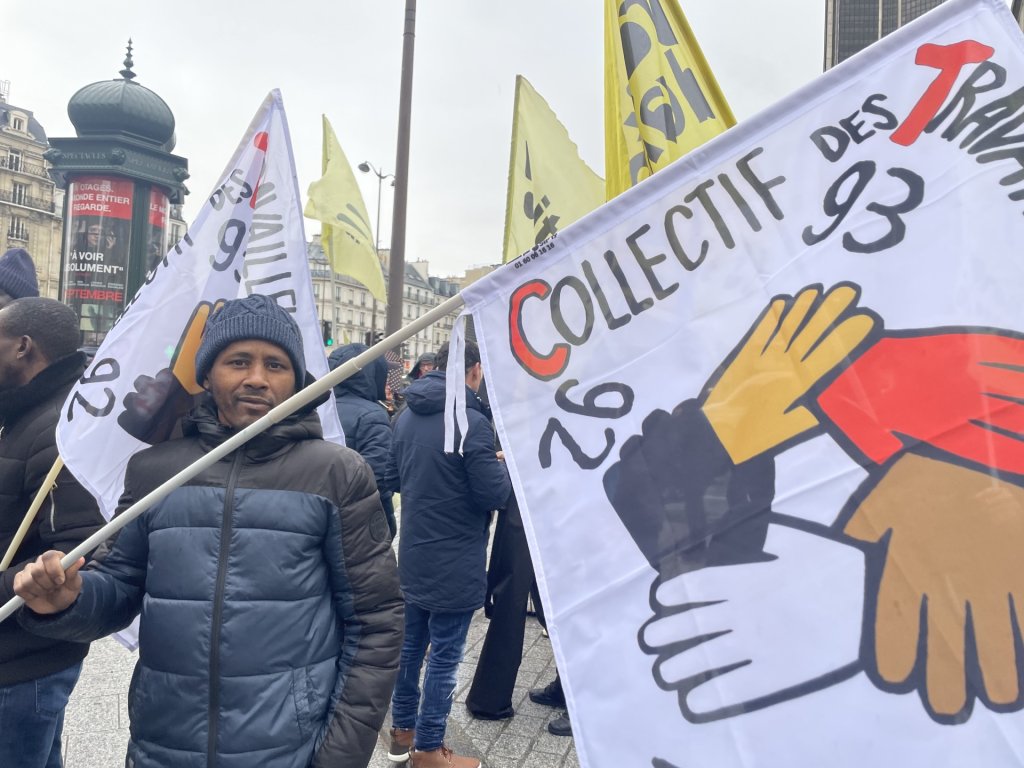Gathering in Paris on January 31, many undocumented workers protested against the latest immigration law and the new Retailleau order, which tightens regularization criteria. Protesters call the order "unfair," saying it worsens their precarious situation. Here are their stories.
Ramata, an Ivorian woman living in France since 2016
"I am very stressed, I feel so threatened. As soon as I speak, I cry... I work in housekeeping, I am in great pain. When you don't have papers, you suffer a lot anyway. You work holding your breath. Our employers give us three hours of work… five hours... Sometimes more, sometimes less. Without a contract, it's constant stress. You never know how much you're going to be paid.
I have faith in working, but without documentation, you get discouraged. I filed a regularization application in 2021, it was refused. I didn't give up. I filed a new application. Where I work now, I get pay slips, so I asked for an appointment again at the prefecture. That was last year. The appointment is set for June 2025. I had to wait a year!
With the new order, what will happen to me? I have to speak French, which I do, I need pay slips, which I do too. But I am still stressed. If my boss fires me before the appointment, what will I do? I have to work without ever stopping.
The new Retailleau order (“circulaire”), which governs the regularization of foreign workers, is considered "very restrictive" by undocumented workers. It requires to provide proof of at least seven years of residency in France, compared to five or three years previously and to provide advanced proof of French proficiency - a diploma or a language certification. The previous Valls order simply required spoken proficiency of the French language. In the event of refusal of the regularization request, the prefecture will now have to "systematically" issue a deportation order (“OQTF, Obligation de quitter le territoire français”) to the undocumented person in question.

I left my children in the Ivory Coast, my youngest is one year old... I left her to come here, thinking that everything would be fine, but it's quite the opposite. My first daughter is now nine years old, she asks me to come back... I miss her so much. I told her: 'I'm fighting for you here, my darling. I can't go back otherwise I will never be able to come back to France, I won't be able to pay for your studies later'. It's not easy..."
Read AlsoFrance: New government measures to regularize undocumented migrants
Awa, an Ivorian woman living in France since 2013
"I came to protest against the Retailleau order and the Darmanin law [the Jan. 2024 immigration reform, editor's note].
I learned that you have to stay seven years in France before applying for regularization. How do you manage to live for seven years without papers? I work under an alias, because my employer doesn't want to hire undocumented workers. I'm stuck... I don't have any pay slips, I don't have any proof of my work to present to the authorities. So I can't file for regularization.
Working under an alias means working illegally with the identity papers of another person, who is in order. So it's this "alias" who receives the pay slips and collects the salary of the undocumented worker. "The alias" then pays him what is due, in part or in full. It is a system that makes undocumented immigrants precarious. It is also a practice that many employers pretend to ignore.
I also learned that if your application is rejected, you will receive an OQTF [deportation order, editor's note]. The consequence is that fewer and fewer people will go to the prefecture, there will be fewer requests for regularization, people will be too afraid of being deported.
But I agree with the measure that requires speaking good French. You can't come to a country and not speak its language."
Oumar, a Senegalese man living in France for six years
"I work in logistics, in delivery, in transport, in catering, in construction. I work pretty much everywhere, in fact. When you don't have documentation, you can't rest. You are constantly looking for work. The worst thing is that you are exhausted and you are not well paid.
I have already submitted a regularization application to the prefecture and it was rejected.

If I apply again, what will happen? It is not a good thing, these deportation orders [they are systematically issued in the event of a rejected regularization application, editor's note]. It is unfair. I work to feed my family in Senegal. I came here alone. I have been here for six years without having seen my family... And I cannot return home.
Because of this law, because of this order, we are blocked.
Our life was already complicated, it is going to become hell. We'll have to wait seven years before we have a chance to be legal! Three years of presence was OK, but seven years is almost a lifetime for us!"
Read AlsoFrench prime minister's 'migratory submersion' claim is unfounded, say experts
Ibrahim, a Senegalese man living in France for seven years
"I'm here to demand rights. We are citizens too, we help keep the economic life of this country going.
Look, we're protesting without causing any damage, we're protesting so that the French people can hear us too. We're calling on all undocumented immigrants to wake up. Waiting seven years to, in the end, maybe be refused, and receive a deportation order Honestly, it's not serious... Now people are going to be terrified of going out to work, of going to the prefecture.
We're just looking for work. We're not criminals. Most immigrants come to France to integrate, not to do whatever they want on French territory.
I had a one-year residence permit that expired not long ago. I applied for renewal, but I have to wait three months before my appointment. In concrete terms, I don't have the right to work during these three months, what am I going to do? And what will happen if I'm not renewed?
I have no choice, I currently wash dishes in a restaurant, and frankly it's hard. Sometimes, you work and then one day, you show up, they tell you: 'No, it's over', and you can't say anything.
I earn between 900 and 1,200 euros per month. Like everyone here, I just work to survive, that's all.
I would like to be regularized and do a better job. If my situation improves and stabilizes, I would like to do training to work in plumbing."
Shawon, a Bangladeshi man living in France since 2020
"I have been here for four years. As soon as I show up for a job, they ask me for documentation, and since I don't have any, they refuse me. Since I arrived in France, I have worked for a few months, that's all. And I haven't had a pay slip.
Without documentation, you can't do anything.
Fortunately, I have family here to help me and house me. My wife has a residence permit. But I would like to do more, I would like to help her financially.
The Retailleau order requires a good level of French. I have a French certificate at level A1, so I am preparing for level A2, to put all the chances on my side.
This order is really not a good thing. I will have to wait another two years, until 2027, to reach the "seven years" of presence in France and apply for papers... It's too long."
